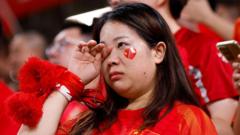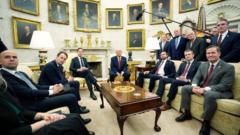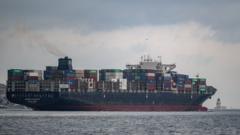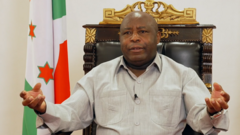China's diplomatic balancing act between the Democratic Republic of Congo and Rwanda is being tested amid escalating violence involving M23 rebels. While historically maintaining non-involvement in African conflicts, recent statements from China indicate a shift as it addresses Rwanda's military support for the rebels, influenced by concerns over its economic interests in the mineral-rich region.
China Navigates Diplomatic Turbulence Amidst DR Congo Conflict
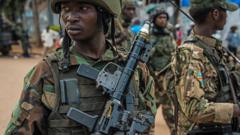
China Navigates Diplomatic Turbulence Amidst DR Congo Conflict
As the DR Congo continues to struggle with conflict fueled by Rwandan-backed rebels, China's diplomatic stance is undergoing scrutiny.
China's diplomatic approach toward Africa, particularly in conflict situations, has long been characterized by a policy of neutrality and non-interference. However, the recent developments in the eastern Democratic Republic of Congo (DRC), where Rwandan-backed M23 rebels have intensified their actions, have prompted a reevaluation of this stance. The M23's control over significant cities, including Goma and Bukavu, has raised alarms for Beijing, which has invested heavily in the region's mineral wealth.
Historically, China has opted for a hands-off approach, avoiding overt criticism of African nations embroiled in disputes. Its comments regarding the unrest have typically circled around urging political dialogue through international bodies rather than naming specific countries involved. However, a significant shift has occurred following the M23's substantial territorial gains, with China's UN representatives calling out Rwanda directly for its military support of the rebels.
This is a notable departure from China's previous practice of maintaining a more ambiguous position. Analysts suggest this shift was catalyzed by UN reports providing evidence of Rwanda's involvement with the M23, making it clear that the situation cannot be ignored any longer. “The problem has been ongoing, and there is a collective awareness,” states expert Professor Zhou Yuyuan, indicating a growing consensus within the UN Security Council.
Rwanda's military support for the M23 could undermine China's extensive economic interests in the DRC, where mining operations and infrastructure projects are vital. The DRC is known for its vast mineral resources, such as coltan and cobalt, essential for various industries, particularly in technology and electric vehicle sectors. With much of China's mining activity concentrated in the conflict-affected eastern provinces, stability is paramount for uninterrupted operations.
Despite the tensions, both Rwanda and the DRC's relations with China remain essential. China has provided significant investments and loans for infrastructure projects in both nations as part of its Belt and Road Initiative. The economic interdependence implies that resolving the ongoing conflict aligns with China's long-term ambitions in the region.
Although China has sold weapons to both nations, the specific dynamics of military support relating to the M23 and its reliance on Chinese arms remain unclear. The repercussions of the conflict for Chinese investments are still being assessed, but the potential impact on operations—especially in the mineral sector—could provoke further diplomatic recalibrations from Beijing.
Going forward, as China attempts to maintain its commercial interests while navigating the complexities of regional diplomacy, the eyes of the world are firmly on its responses to the evolving situation in the DRC. The stakes are high, and balancing relations with both countries will require a delicate and thoughtful strategy.













